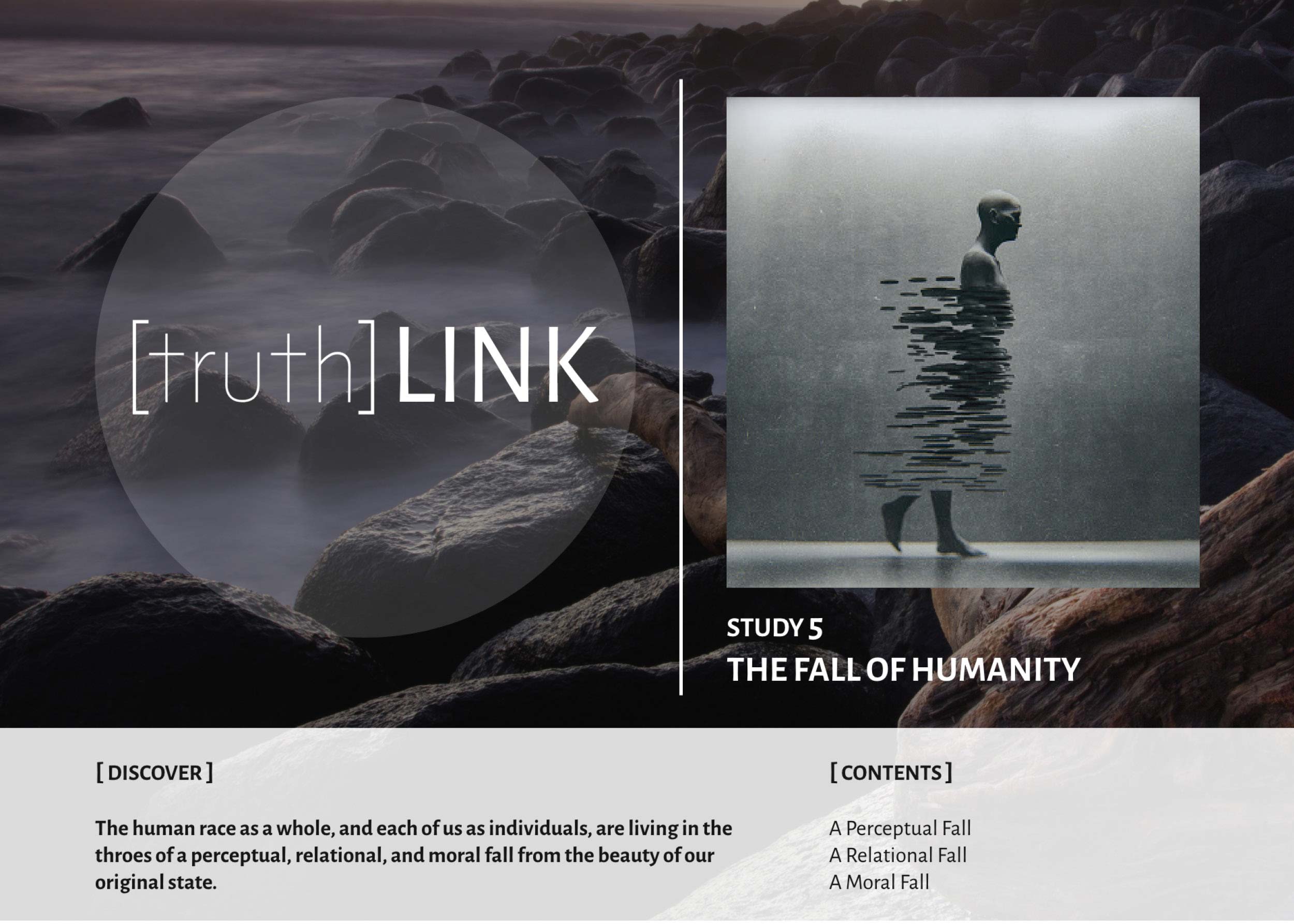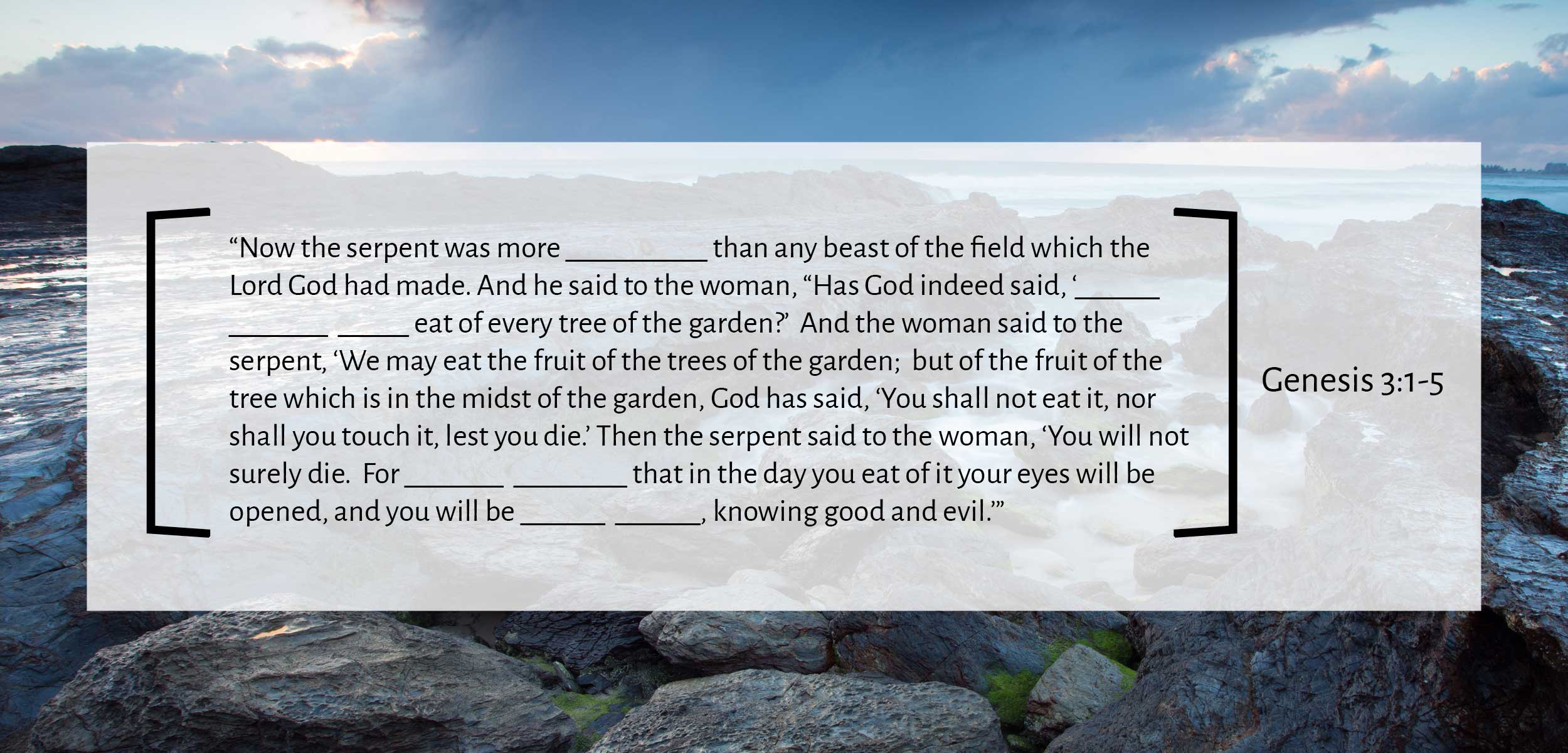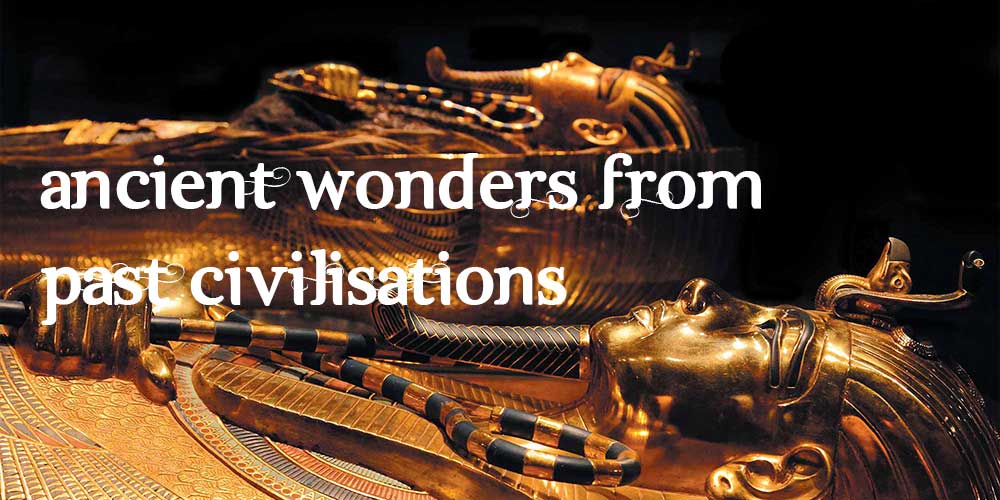
A Perceptual Fall
At the psychological core of the fallen human condition there lies a deeply embedded perceptual distortion. We all naturally harbor some significant degree of apprehension about God due to the primal lie that was received into human consciousness by our first parents, Adam and Eve. We pick up the story in Genesis 3:1-5:

First, let’s identify who we’re dealing with here. The serpent in this account is none other than Satan, the fallen angel we profiled in our previous study. Revelation 12:9 makes this clear:
“So the great dragon was cast out, that serpent of old, called the _________ and __________, who deceives the whole world; he was cast to the earth, and his angels were cast out with him.”
Satan approached humanity with the intent to deceive, thus he is called “cunning.” The target of his deception is the human mind and his subject is the character of God. First, he suggests that God is restrictive:
“Has God indeed said, ‘You shall not eat of every tree of the garden?’”
Actually, God said no such thing. He had, in fact, framed the human situation as one of expansive freedom with a minor restriction, and that only for the protection of humanity from harmful consequences (Genesis 2:16). Satan came along and subtly reframed God’s word to convey the idea of total restriction with freedom dropped completely from the picture.
Secondly, Satan portrayed God as untrustworthy, as a liar:
“You will not surely die.” God says you will, but you won’t.
Thirdly—and this is the bottom line of the deception—Satan painted God as self-serving, suggesting that He holds a monopoly on a higher state of being that humanity might access if God weren’t keeping it for Himself:
“For God knows that in the day you eat of it your eyes will be opened, and you will be like God, knowing good and evil.”
The crucial point to grasp is that the sin-problem began with deception regarding the kind of person God is. Essentially Satan denied that “God is love” and misrepresented the Creator as a selfish tyrant, which brings us to the relational aspect of the Fall.
A Relational Fall
Once the primal lie was received into the mind, or believed, relational breakdown immediately followed. Continuing in the Genesis account:
“So when the woman _____ that the tree was good for food, that it was pleasant to the eyes, and a tree desirable to make one wise, she ______ of its fruit and _____. She also gave to her husband with her, and he ate. Then the eyes of both of them were __________, and they ________ that they were _________; and they sewed fig leaves together and made themselves coverings. And they heard the sound of the Lord God walking in the garden in the cool of the day, and Adam and his wife _____ themselves from the presence of the Lord God among the trees of the garden. Then the Lord God called to Adam and said to him, ‘Where are you?’ So he said, ‘I heard Your voice in the garden, and I was afraid because I was naked; and I hid myself.’ And He said, ‘Who told you that you were naked? Have you eaten from the tree of which I commanded you that you should not eat?’ Then the man said, ‘The _________ whom _______ gave to be with me, _____ gave me of the tree, and I ate’” (Genesis 3:6-12).
First, we see that the vertical relationship was broken: God and humanity were separated. Because they no longer believed in the integrity of God’s love, they ceased to trust God and ventured out in self-preserving rebellion against Him. Then, as a direct result, the horizontal relationship between human beings fell apart. When given a chance to take responsibility, the new natural impulse was to defend self by casting blame on one another, and ultimately on God. Once they crossed this line, an immediate sense of nakedness, or guilt, came upon them because now they were living the lie and moving behaviorally in violation against the very design of their nature, a design that dictated that they live in relational love and trust, which were now broken.
A Moral Fall
Paul gives us a clear understanding of what sin is when he says:

In the Bible the word “glory” refers to the radiant outshining of what makes God who God is at heart. It’s the inner content of God’s character shining outward in His deeds. It’s the way God thinks and feels and behaves.
Discover this biblical idea of “glory” by reading and discussing Exodus 33:18-19.
When Paul says that sin is constituted in falling short of God’s glory, he is defining sin as disharmony with the basic essence of God’s character, which the Bible defines as self-giving love (1 John 4:8). So sin is anything that runs contrary to God’s character and, thus, violates the integrity of His love.
The comparison of the following two Scriptures sheds additional light of the precise nature of sin:
“Sin is transgression of the ______” (1 John 3:4, KJV).
And “love is the fulfillment of the ______” (Romans 13:10).
The Fall of mankind involves moral derangement. Whereas God had created humanity to live in love (relational faithfulness), the Fall resulted in turning human beings into creatures of anti-love (relational violation). We hurt one another, we cross moral lines, and we tend to do what fulfills our individual urges at the expense of others. In short, the Fall of mankind was and is entailed in selfishness taking the place of love as our core motivational impulse.
By contrast, in Christ we see the crystal clear truth about God. “You shall know the truth,” He said, “and the truth shall make you free” (John 8:32). Not truths in general or in the abstract, but the truth, singular, about God’s character in contrast to the lie, singular, that Satan has disseminated regarding God. Speaking to the religious leaders of His day, Jesus highlighted the singular nature of the lie they had believed in contrast to the truth He embodied:
“You are of your father the devil, and the ___________ of your father you want to ____. He was a murderer from the beginning, and does not stand in _____ _________, because there is no truth in him. When he speaks ___ ______, he speaks from his own resources, for he is a liar and the father of ___” (John 8:44).
Notice the connection between deception, desires, and deeds. Buying into Satan’s lie regarding the character of God generates antagonistic desires toward God, which in turn produce rebellious actions against God. Our thoughts (beliefs) determine our feeling, which determine our actions, which reinforce our thoughts. The Fall of mankind began with believing falsehood regarding God, which then led to broken trust or emotional disconnect from God, which then led to moral rebellion on the behavioural level.
[CONNECT]
Jesus passed over the same ground as Adam and Eve and maintained relational integrity on both the vertical and the horizontal planes.
He remained faithful in love to God and to us.
As Satan came to our first parents subtly tempting them to doubt God’s love and cease trusting Him, so also he came to Christ. According to the account given to us in Matthew 4:1-11, the devil’s attack on Jesus took the form of three temptations. In the first two, Satan sought to drive a wedge between Jesus and the Father by casting doubt upon their relationship: “If you are the Son . . .”
You’re in a predicament, Jesus, but if the Father does love you, then surely He’ll relieve your suffering and protect you from harm.
If Jesus had doubted the Father’s love, He would have yielded to the temptation and asserted independence from the Father. But His confidence in God’s love remained unbroken. In the third temptation, Christ was pressed by Satan to acknowledge his dominance over humanity by worshiping him. If Jesus had yielded, it would have amounted to an abandonment of humanity for purposes of self-exaltation. But His love for us remained constant. Jesus retraced the steps of our first parents and redeemed their failures. In Him, complete relational integrity is restored.
[EXPERIENCE]
It is my desire to experience restored trust in my heart toward God by believing the truth of His love for me.
God “desires all men to be saved and to come to the knowledge of the truth” (1 Timothy 2:4). Coming to know—not merely factually, but experientially—the truth of who God really is will save us from the perceptual, relational, and moral effects of the Fall. Thank you, God, for making Your true character known through Christ!
Phone 1300 300 389























